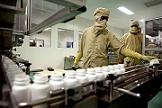Fraud
Ranbaxy faces fraud probe by US Food and Drug Administration
 Ranbaxy, India's largest producer of generic drugs, is being investigated by United States officials for alleged fraud that may have led to substandard medicines being sold in the US.
Ranbaxy, India's largest producer of generic drugs, is being investigated by United States officials for alleged fraud that may have led to substandard medicines being sold in the US.
The Indian company confirmed that it has been approached by federal investigators, but dismissed the allegations as baseless. "No prosecution has been initiated," a Ranbaxy spokesman said.
The news that the US Food and Drug Administration (FDA) has filed a motion seeking documents from the Indian drugmaker as part of an ongoing investigation may affect the takeover of Ranbaxy by Daiichi, the Japanese drugs company, a landmark deal set to be worth as much as $4.6 billion (£2.3 billion).
Sonal Guota, an analyst at UBS, said: "We believe there could be close to 50 per cent downside to [Ranbaxy's] stock if Daiichi Sankyo were to withdraw its current offer to buy a majority stake in the company ... Following this event, we are placing our target price and rating under review."
It is understood that Daiichi is currently conducting due diligence to ascertain the extent of Ranbaxy's legal liabilities.
The FDA has claimed that there is evidence to suggest that Ranbaxy used active pharmaceutical ingredients from unapproved sources, resulting in the sale of "subpotent, super potent or adulterated medicines" in the US. It is alleged that test data was fabricated to show that medicines met FDA standards.
Ranbaxy is no stranger to complex legal proceedings. Over the past 18 months, the group has settled at least five patent lawsuits out of court. The largest was with Pfizer, the US giant, over the rights to produce Lipitor, the blockbuster anti-cholesterol drug.
India's generics drugs industry has been the focus of FDA scrutiny for several years. Several Ranbaxy plants have been inspected in recent years by FDA staff.
In February last year, the US Department of Justice raided a Ranbaxy office in New Jersey.
Shares in Ranbaxy fell nearly 10 per cent in early trade in Bombay.
(Published by Times Online - july 14, 2008)